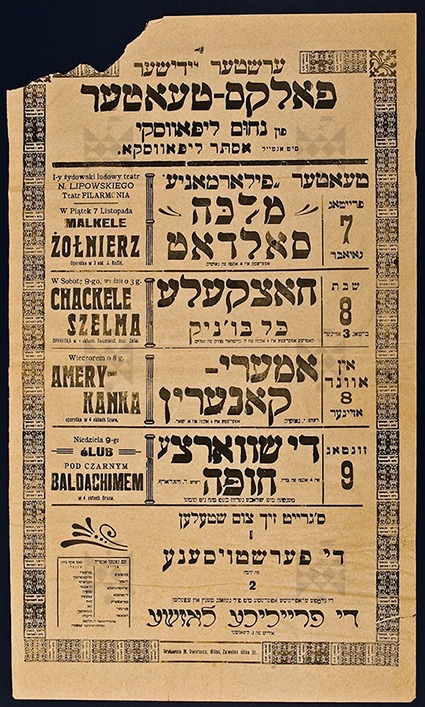EXHIBIT OF THE MONTH |
← |
Published: 2021-07-01
The Vilna Gaon Museum of Jewish History houses posters of interwar Yiddish theatres, copies of which also adorn the Samuel Bak Museum. However, due to the fact that the posters are written in an alphabet that only few can read, they often remain silent to visitors.
The title of this poster reads: ‘The first Yiddish National Theatre, directed by Nachum Lipovsky, with the contribution of Ester Lipovska.’ Nachum Lipovsky was born in 1874 in Nesvizh. He lost both of his parents as a child and at the age of twelve came to Vilnius being an orphan. Later in life Lipovsky went to Moscow, where he learned about theatre. Although he was an excellent actor, when working in the troupe of Avrom Icchok Kaminsky, his great talent as a manager was revealed and Lipovsky took on behind-the-scenes organisational work and led Yiddish theatre troupes.
In 1883, performances in Yiddish were banned in the Russian Empire. Due to the vocal resemblance between Yiddish and German, creative theatre representatives tended to solve the problem by asking for permission to perform in German, but the risk of being exposed and punished remained. It was Lipovsky who took a decisive step to change the situation for the better. He was on good terms with the government, had contacts with actors of the Russian theatre and excellent organisational skills, which allowed him to contribute to the restoration of the activities of the Yiddish theatre. On 20 June 1903, with the help of Russian actors, Lipovsky received permission from the Russian imperial government to officially resume performances in Yiddish.
In 1908, Lipovsky founded the Folks Teater in Vilnius, the operations of which were disrupted by World War I. Still, in 1918, the theatre reopened again. The poster announces the events of a weekend in November 1919. Friday was the day of the operetta ‘Malkele the Soldier’, and two more performances were held on Saturday: the operetta ‘Chackele the Hooligan’ and ‘The American’. On Sunday, the audience was invited to the performance ‘Under the Black Chuppah’. Not only does the title of the play sound threatening, it seems that the plot was also intimidating and the title of this play had an additional inscription saying ‘Easily disturbed people should not come to the play’.
Prepared by: Saulė Valiūnaitė, Head of Department of the Museum of Culture and Identity of Lithuanian Jews
| ↑ | ← |

